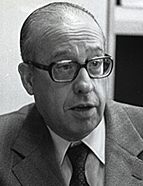

Particularly in his last years he sought motivation for a much-cherished project: the relationship between history and Romanesque fiction. In this regard, he converges with Herculano, who devoted a part (perhaps the least interesting nowadays) of his work to writing. In the words of the liberal historian, it was a question of, “restoring the heart of what is dead with the heart of what lives, the genius of a people long gone by the genius of a living people.” Further ahead he quotes Alfred de Vigny to use the formula he deems exceptional: “History presents collective movements, social actions, but does not go deep into the intimacy of the human being. That is only possible in fiction.”
One cannot forget that the historian and the (political) citizen are two faces of the same personality. Thus, analysing the author of História de Portugal: “Discordance, (when it exists) between the historian and the politician is grounded on the attitude of each. The historian verifies and records, the politician assesses in view of certain values and then chooses paths. Therefore, we see Herculano, a defender of complexity in the civilization process, which in his view should be guided by the two principles of citizenship and freedom on the one hand, and by the improvement of the material conditions of existence on the other hand, emphasizing the inventions and innovations (to use current terminology) that changed the life of humanity.” It is to be noted that this text is linked to the “Foreword” to Gustave Glotz or the “Introduction” to Condorcet, he had published in 1946. Naturally nuanced and restructured (and mostly enriched in complexity), the reasoning of Magalhães Godinho remains, however, unaltered in time. As if he were referring to himself, Herculano “emphasises the relevance of technical developments for the general history of civilization.” These are key pages to understand the critic and the criticized, the first to understand, with several biases, the Renaissance, and the Modern Age, the other who establishes a dialogue with him, as if he were right before him, explaining to him what he should have thought and written. “Herculano is unfair”, particularly because he ignores the breakthrough of modern science “with algebra, Descartes’ analytical geometry, Galileo’s mechanics, Kepler’s astronomy and later Leibnitz’s and Newton’s calculus. That religion has a thinker such as Pascal, philosophers such as Hobbes, Spinoza, Loxke, and Bayle publishes his Dictionary, the source for all Enlightenment.” In conclusion, “our problem is the future, and the liberty-inequality dilemma.” In the 19th century, as also today, when historian and citizen Vitorino Magalhães Godinho, as one, sought to understand, in a restlessness that saw no appeasement.
